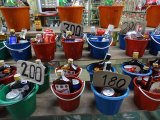As many as 20 Western tourists have died in similar circumstances around Southeast Asia since 2009, according to coroner Renee Roussy, Canadian media reported.
A ruling by the coroner released in Quebec on Monday states that autopsies conducted in Bangkok four days after the Belanger sisters' bodies were discovered concluded the two young women had not died as the result of violence or trauma.
Toxicologists believe phosphine, a compound chemical also used as a pesticide, may have been the root cause of death. Phosphine is a highly toxic pesticide used to kill bed bugs.
The holidaying sisters were both found dead in their room at a resort on Phi Phi in 2012 by a maid. Both were covered in vomit, with their fingernails and toenails tinged blue.
Pathologists in Thailand confirmed the presence of diethyltoluamide (DEET), a chemical used to kill insects.
The resort where the sisters died is owned by a Phuket family. Many tourists travel from Phuket by ferry to stay on Phi Phi, where the hectic nature of the night life matches the beauty of the scenery.
The mystery of how and why Audrey Belanger, 20, and her sister Noemi, 25, died represents another chapter in the romantic Thai holiday island's troubled recent history.
In 2009, two other young women, Jill St Onge, 27, an American, and Julie Bergheim, 22, a Norwegian, died on Phi Phi in similarly mysterious circumstances.
Further studies completed in Quebec noted that the quantity of DEET mentioned in the Thai report would not have been toxic or lethal, Canada's media reported.
Nevertheless, coroner Roussy says she believes the women were likely intoxicated because both had been violently ill at the same time.
Phosphine is one of few substances that can kill and leave little trace in the environment or in the body, according to the coroner's report.
''Phosphine is a pesticide that kills all that lives and all that breathes,'' states the report. The product is efficient, cheap and widely available in Asia.
Though phosphine fumigation in hotel rooms is forbidden in Thailand, the coroner says the product may still have been used.
''Science doesn't allow us to confirm this without a doubt,'' Roussy said. ''Maybe one day it will.''
A joint investigation by Radio-Canada's Enquete and CBC's Fifth Estate concluded the highly toxic pesticide used to control bedbugs in some holiday hotels in Asia may have caused the Belanger sisters' deaths.
Canadian media reports have yet to disclose details about the 20 Western tourists who have allegedly died in Southeast Asia in similar circumstances since 2009.
That year, Norwegian Julie Bergheim and American Jill St Onge were staying in adjacent rooms at the Laleena Guest House on Phi Phi, and they experienced similar symptoms including vomiting, dizziness and blue fingernails and toenails. Both were dead within 24 hours, CBC reported.
Four years after Bergheim's death, her mother, Ina Thoresen, received a report from the Norwegian Institute of Public Health. Authorities there had consulted with leading experts from around the world about what happened to her daughter.
Although they could not state the exact cause of Bergheim's death, they concluded that the most likely cause was poisoning from the phosphine gas released by the pesticide.
Bergheim's companion, Karina Refseth, narrowly escaped death. Ryan Kells, the fiance of Jill St Onge, also fell ill but recovered and was forced by officials on Phi Phi to carry her body away from Phi Phi in the bottom of a speedboat.
Ryan's father John Kells wrote in 2010: ''What killed Jill St Onge and Julie Bergheim? What lethal gas almost also killed their companions Karina Refseth and Ryan Kells?
''The two absolutely linked deaths, hours apart, separated by a common wall less than six inches thick, in two back facing air conditioned rooms of the Laleena Guest House, rooms No. 4 and No. 5, one Norwegian, one American, unknown to each other, were apparently caused by the lethal inhalation of a toxic gas that has not been identified.
''Young adventurous explorers like Jill, Julie, Ryan and Karina, from countries all over the world, travel to the island of Kho Phi Phi, described as one of the most beautiful spots on earth as featured in the film 'The Beach', staring Leonardo DiCaprio, believe that they are safe and expect to travel home with exotic memories and not the ashes of the love of their lives or the one that they intended to marry.
''One thing we do believe is that both Julie and Jill had elevated blood levels of cholinesterase inhibitor, a likely sign of pesticide gas poisoning, as suggested by a couple of research experts asked to comment on the blood results.
''We also know that the implied causes investigated by the Thailand authorities such as alcohol and drugs have been eliminated as potential causes of death. All of the investigative effort thus far has focused on life style causes and to our knowledge no effort has been expended to determine if a pesticide might have been the lethal agent.''
The four Phi Phi deaths have also been linked to a series of deaths in Chiang Mai, mostly at the Downtown Inn, a hotel that has since been demolished, and two deaths in Vietnam.
A British couple, a young New Zealander and a Thai tourist guide died in still largely unexplained circumstances in Chiang Mai.




















Good report. Thanks for it.
Posted by The News Mare on March 3, 2015 09:43